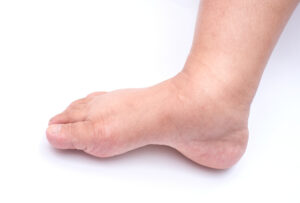Swelling in your lower legs (edema) can be a sign of vein health trouble. That's something Jessica Simpson discovered when she experienced terrible lower leg swelling during her 2019 pregnancy. Clearly, her edema was highly noticeable. But sometimes, you may not notice subtle swelling. And that’s when looking at your sock line can help you identify brewing trouble.
At the end of the day, when you take off your socks, you shouldn’t see any significant, pitting, depressions or grooves in your skin. Faint impressions from socks are completely normal, but If your socks leave deep marks on your legs or ankles, that’s a sign you have developed lower extremity edema throughout your day.

Edema is a broad medical term that refers to fluid buildup anywhere in your body. As vascular specialists, we mostly diagnose and treat edema in your lower legs. While minor swelling after a long day isn’t a problem, chronic edema can indicate problems with your circulatory system. Which is why we give edema patients a thorough diagnostic ultrasound to try and determine the underlying cause of your swollen legs, ankles and feet.
If you have generalized edema, it could be a sign of kidney disease or even congestive heart failure. But localized edema, like the type we usually see targeting your legs, ankles, and feet, is more common. You’ll mostly notice this type of fluid buildup after a long airplane flight, or if you’ve been on your feet all day.
Chronic venous insufficiency (CVI) is the most common cause of this leg swelling. CVI is a term we use to refer to an illness that damages valves in your leg veins. Once damaged, these valves can’t fully close, so blood pools in your legs instead of traveling up to your heart. Over time, some fluid may escape into your leg and foot tissue. That’s when you’ll notice swelling, and you may also notice inflammation.
There are other causes of edema, and we can diagnose them in our vein centers. These include blood clots in your lower legs' deep veins (called a deep vein thrombosis or DVT). Pregnancy can also lead to this kind of swelling, as can your monthly menstrual cycle. Some medications and diseases will also lead to edema, and this is why we take a medical history at every visit to try and determine what's causing the swelling in your legs. Then, once we arrive at an accurate diagnosis, we can begin to create your customized treatment plan. Our therapies will reduce your existing swelling and help prevent your problems from recurring.
We have several ways to address edema. The first is compression therapy, which uses pressure to keep blood and fluid from pooling in your lower legs. Lifestyle changes such as reducing your sodium intake and spending less time on your feet can also manage your edema.
We may also recommend Radiofrequency vein ablation (RFA) to treat your CVI and edema. RFA is a minimally invasive procedure; we insert a catheter into your abnormal vein and supply it with heat energy, making it close permanently. All you need for RFA is a local anesthetic; it’s a virtually pain free procedure that leaves almost no scars behind. Best of all? We can complete the out-patient procedure in less than an hour, and you can return to normal activities right away.
And, if a DVT is to blame, you may need anticoagulants such as rivaroxaban or apixaban, or low molecular weight heparin to manage your clot risk as well as your edema symptoms, according to this study.
Now, you’ll need a thorough examination to determine the cause of your edema and decided which treatment is best for your symptoms. But don’t delay—CVI gets worse without treatment. So click here to request an appointment click here to request an appointment click here to request an appointment with our teams in Houston or Dallas. We can get you scheduled for a diagnostic ultrasound, discover the cause of your swelling and provide you with a recommended treatment plan!

Scheduling
Please contact our dedicated specialists to schedule a consultation today.
2024 Texas Endovascular. All rights reserved. Website Design by Healthcare Success